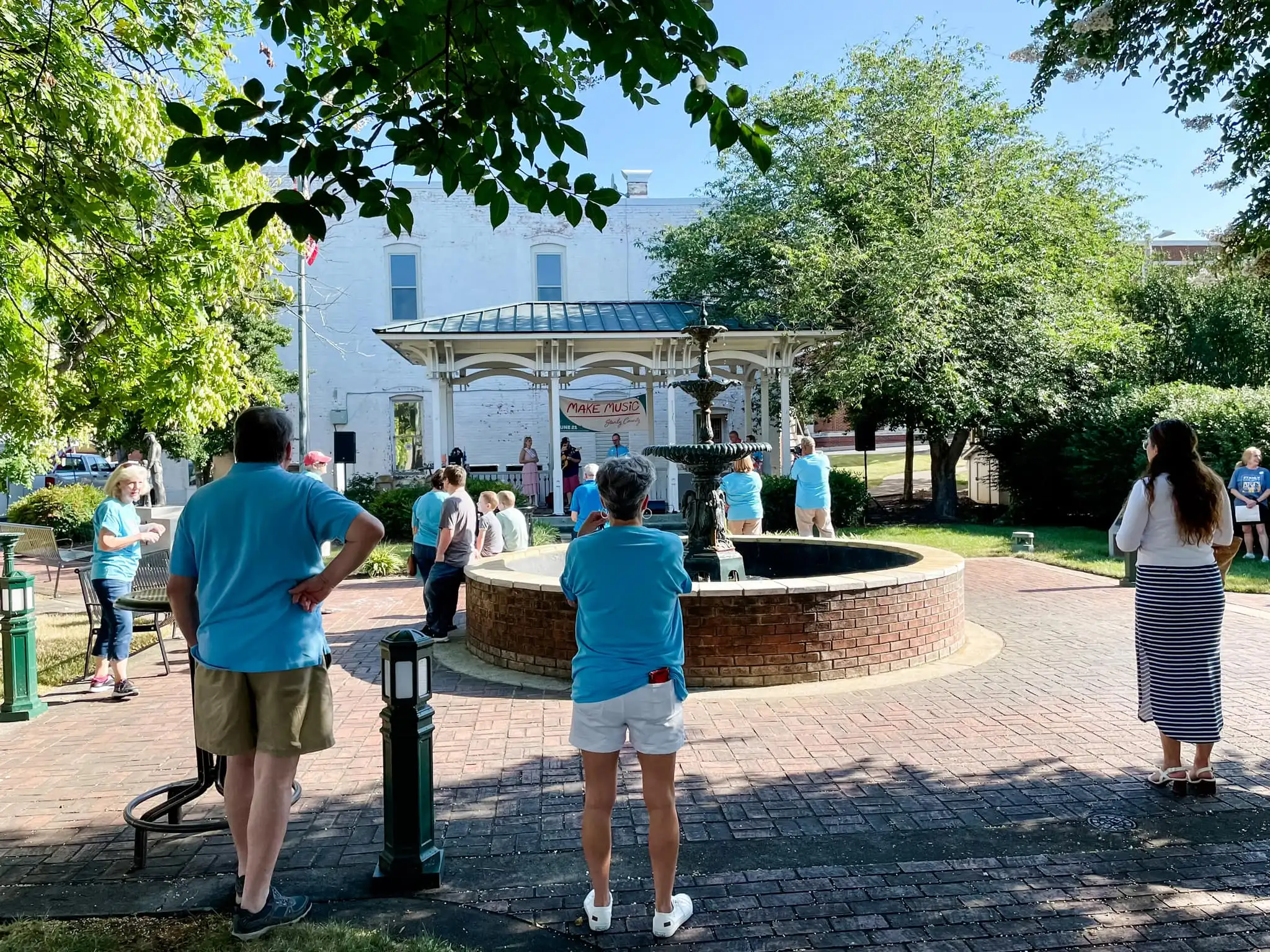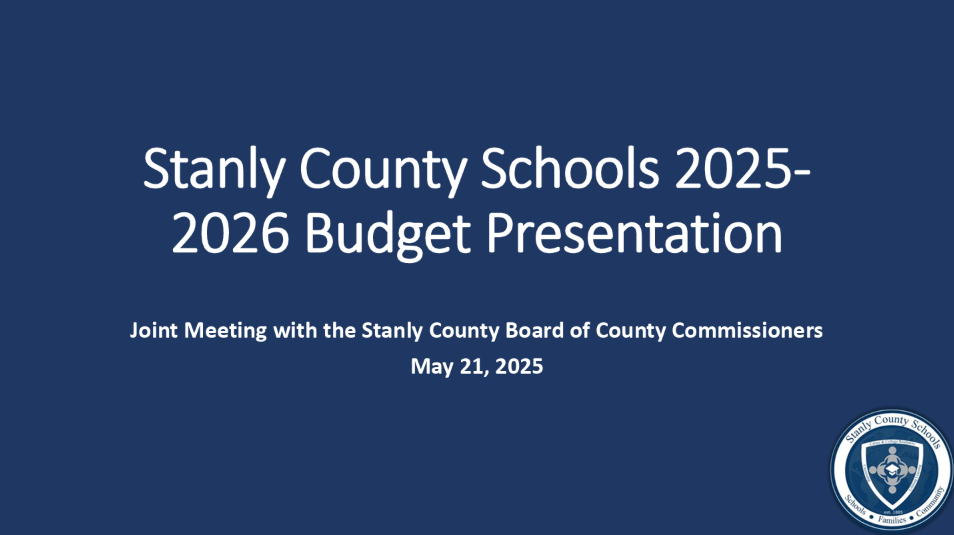SPIRIT OF STANLY 2023: Uwharrie Harm Reduction Initiative works to help vulnerable, overlooked in community
Published 2:54 pm Sunday, April 2, 2023
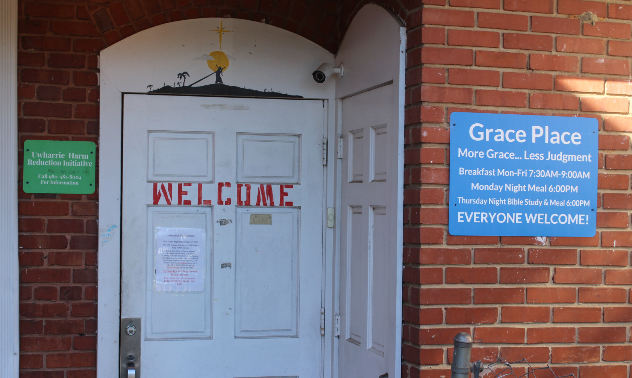
- UHRI, which was formed in 2020, is located at Grace Place, in Albemarle.
|
Getting your Trinity Audio player ready...
|
After handing Marcus Berry his identification card for verification, Berry read through a checklist of items Brian could take with him, including clean syringes, fentanyl strips, naloxone — a medication used to reverse or reduce the effects of opioids — alcohol pads and antibiotics. Sherry Harris then handed him a bag of the provisions taken from a large black supply closet.
Brian, who only wished to share his first name, has been using drugs most of his life, including heroin. For the past few months, Brian, 37, has been coming to Uwharrie Harm Reduction Initiative’s office inside Grace Place at 132 Church St., Albemarle, where he talks with peer support specialists like Berry and Harris, who are both former substance users. The office offers supplies to help him use drugs in a safer manner, hoping to extend his life.
“It keeps me from going out on the streets to get stuff to use to do drugs and having to reuse stuff and it cuts down on diseases and having to share needles with people that you know nothing about,” Brian said.
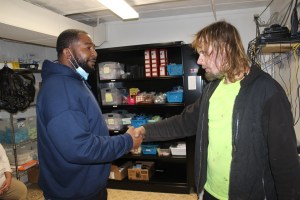
UHRI peer support specialist Marcus Berry interacts with Brian, a client of URHI.
UHRI was founded in early 2020 and is under the umbrella of Open Hands of North Carolina, a faith-based organization headquartered in Lexington. It strives to reach people, many of whom are homeless, where they are and help them establish goals and expectations about their future, hoping individuals struggling with addiction will change their behavior and seek long-term help.
Brian appreciates UHRI is not “pounding it in our heads” about the need to seek help such as going to rehab. Instead, leaning into UHRI’s motto of “more grace…less judgement,” Berry and the others take the time to listen and get to know the people as humans, and over time, relationships and trust will form.
“If I come in and I need to talk to them about something or something is going on that I need help with, I know I can talk with them,” said Brian, who said he suffers from depression and anxiety.
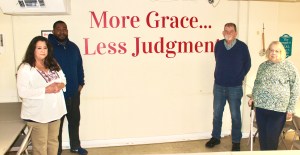
Peer support specialists Sherry Harris and Marcus Berry join with Open Hands Executive Director Bob Harmon and UHRI Executive Director Gay Smith.
Working To Save Lives
Bob Harmon, executive director of Open Hands, knows about the power of forming relationships with people in order to help them.
Harmon began volunteering in the 1990s at the homeless shelter in Cabarrus County. He remembers encountering a former star high school athlete who had been on the streets for many years.
“The worst part of it is that I’m invisible,” Harmon recalled the man telling him. “I walk down the street and people don’t see me. They look the other way.
“You see this guy walking around and he doesn’t exist because you don’t want to see him,” Harmon added.
That was a profound moment for Harmon, who spent more than a decade in the corporate world before pivoting to work with struggling individuals, like the man at the homeless shelter. In 2013, he became executive director of Open Hands of North Carolina.
Open Hands’ first move into Stanly County occurred in 2016, when the feeding ministry Soul Food, known more often now as Grace Place, was formed to provide meals to people on the streets and others who might be struggling.
Taking advantage of the connections already formed with people in the community through feeding ministry, in March 2020, a few weeks before the onset of the COVID-19 pandemic, Open Hands began UHRI, a 501-c-3 nonprofit organization, to help combat the opioid epidemic, which was killing tons of people each year. Stanly was often featured on the state’s monthly list of top 10 counties with the highest rates of overdoses leading to hospital visits.
“In 2019, Stanly County approached us about working with harm reduction,” Harmon said, noting Open Hands was initially resistant about the prospect.
But after talking with and hearing from people on the streets, many of whom were using unsafe methods, the urgency to help these individuals was apparent.
The ministry is in the basement of Grace Place, the former location of Tabernacle United Methodist Church. Adorned along the walls are messages and images of hope, including a sign that reads: “The struggle is REAL but so is GOD” and a painting of Jesus Christ, adorned with the crown of thorns.

A painting of Jesus Christ hangs on the walls of UHRI’s headquarters in Albemarle.
Since opening its doors three years ago, UHRI has seen the number of people enrolled in its ministry rise from 115 people in 2020 to about 300 last year. The ministry calculates that by providing an average of 100 naloxone kits to people per month and assuming that about 20 are not used, roughly 40 overdoses are reversed each month. UHRI has provided naloxone to more than 3,000 people.
Berry estimates around 40 people often come to UHRI headquarters between 1 p.m. and 4 p.m. Tuesday and Friday to pick up syringes, naloxone, fentanyl test strips and other supplies that they may need. People receive a pack of 50 syringes (the needle size can vary) and are required to take 100 alcohol pads.
One regular is 31-year-old Albemarle resident Vickie Harrison, a fentanyl user. She appreciates the opportunity each week to get clean supplies, saying that before she started coming here, she would often use the same syringe multiple times.
“They don’t ever look down on us,” she said. “That’s the one good thing I love about them: They treat me like I’m a normal person and they are always friendly.”
Harrison often comes with her mother Amy Myers, a former health department employee, who is grateful that the people at UHRI take the time to get to know and care for her daughter.
“I’ll never give up on her,” Myers said, noting she is confident Harrison will someday seek treatment. “Once you’re a mother, you’re always a mother.”
Harmon understands that many in the community are likely critical about what they see as UHRI enabling drug users. But by creating a structured environment where people can receive key supplies as opposed to getting them on the streets, “we’re keeping them alive” and keeping them from contracting diseases, Harmon said.
Without the presence of UHRI in the community, “I’d probably be a lot sicker,” Harrison said, “because I would probably be using old supplies.”
Because of the efforts of UHRI, along with other local groups, including Stanly County EMS, community paramedics, Monarch and Project Lazarus coalition, opioid overdoses in Stanly have declined in recent years. A total of 161 people overdosed in 2022, according to Stanly County EMS data provided by UHRI, compared with 190 people in 2021 and 258 in 2020.
‘On The Frontlines’
Understanding that people are initially hesitant or even skeptical about talking with others about their addictions, UHRI provides a safe space where individuals can speak about their background without being judged or looked down upon.
“We want that relationship with them, we don’t want them to come and be in a cold, institutional-type situation,” Harmon said. “We want them to come in and feel welcome…we want to let them know that we love them.”
The peer support specialists, operating as de facto counselors, play a key role in making sure people — many of whom have gone through traumas in their lives and as a result are initially standoffish — feel secure enough to share their experience with substance use disorder. As recovering substance users themselves, peer support specialists can understand and empathize with the everyday struggles individuals often face.
“They are awesome; they are so sweet,” said Vickie Harrison, noting she has their contact information and the specialists are always available whenever she wants to talk with them.
As part of the funding the county received as part of the national opioid settlement, UHRI was allocated roughly $60,000 to help pay for two peer support specialists. Berry works part time while Harris, who started in late January, is full time.
“We are on the front lines…we go out into those (homeless) camps and take supplies and talk to them and try and build a rapport so they will feel comfortable coming here and talking about what’s going on,” said Berry, who has worked with UHRI since the summer of 2020 and is also a peer support specialist with Monarch. A former drug user and supplier for around 30 years, Berry aspired to become the biggest drug dealer in Charlotte before he turned his life around in 2016 and received treatment.
“Working here has opened me up to a whole other world,” Berry said, noting that at UHRI, “we think about the whole person.”
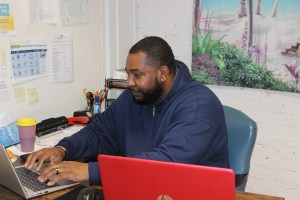
Marcus Berry has been a peer support specialist at UHRI since the summer of 2020.
Harris, 10 years into her recovery, was drawn to the ministry because of its outreach efforts. Much of her and Berry’s time is spent out of the office, getting to know people across the county and spreading the word about UHRI.
“I believe you have to meet people where they are,” she said.
UHRI is working to develop a mobile unit that will allow Berry and Harris to meet and talk with people in the community who might not be able to come to the office.
Over time, once a connection has been established and trust has been secured, the specialists work to help people establish short-term goals about their future.
“We ask them: How do you want your life to look in the next six months?” Berry said. “We try to help them set goals that are obtainable. We don’t talk about 10 years from now. We talk about how do you want your life to look in the next 45 days or so? And they pretty much map it out for you.”
More than anything, the peer support specialists give people hope “that there is a way I can get out of this and I’m not stuck and not going to die,” Harmon said.
Building A Community
The commitment to providing support to some of the most vulnerable in the community often requires significant time and investment. It can take several months or years before individuals feel comfortable enough to seek help and change their lives. UHRI Executive Director Gay Smith recalled talking with a woman each week for two years before she was taken to a sober living house.
“After two years of talking, she was ready,” said Smith, who took over from Robi Cagle, the original director, in August 2022.
Once open to receiving help, UHRI works to find individuals treatment options and funding that meets their needs. The ministry has transported people to detox centers around the greater Charlotte area, including as far as Greenville, South Carolina. During 2021-2022, the group made 120 transports to detox and rehab centers, according to statistics included in a UHRI brochure.
“We’ve taken them wherever they need to go to try and get them help,” Harmon said.
Besides providing supplies, such as syringes, UHRI also operates a clinic where once every other week, medical professionals are available to test for diseases such as HIV, diabetes, Hepatitis C, Hepatitis A and endocarditis, and perform basic first aid care and wound treatment.
Quanna Norman, a community health educator and traveling phlebotomist, has been coming to UHRI every other Tuesday since July 2022. She offers free testing for HIV, syphilis and Hepatitis C.
Thinking she would see the same faces each visit, Norman, 28, said she has been surprised that mostly different people have come to her for testing each week. She estimates she works with around 15 to 20 people each visit.
Norman also takes time to listen whenever people want to talk to her about what they are going through, saying often the people “just need to get things off their chest.”
“You will be surprised how impactful you are when you don’t really think you are,” Norman said. “I have people that tell me, ‘Thank you so much for doing this service. Thank you so much for treating me as a human being. Thank you so much for seeing me and acknowledging me,’” she said.

Community health educator and phlebotomist Quanna Norman prepares to test a patient.
UHRI also helps with necessities such as providing people with hygiene supplies, food bags and warm blankets during the winter. As part of a campaign in November 2022, UHRI received and distributed nearly 300 blankets to those who needed them. The ministry also collaborates with NCWorks Career Center in Albemarle to help get people employed.
With so many people depending upon UHRI to meet many of their needs in order to survive, a strong sense of fellowship has formed.
“To watch folks interact here, this becomes a community,” Harmon said. “It becomes almost like a church to some people.”
Despite the many people UHRI has helped, Harmon would love for there to no longer be a need for his ministry to exist, even though he understands it is unrealistic.
“I hope that one day we’re closed down because we’ve got nothing to do,” he said.





